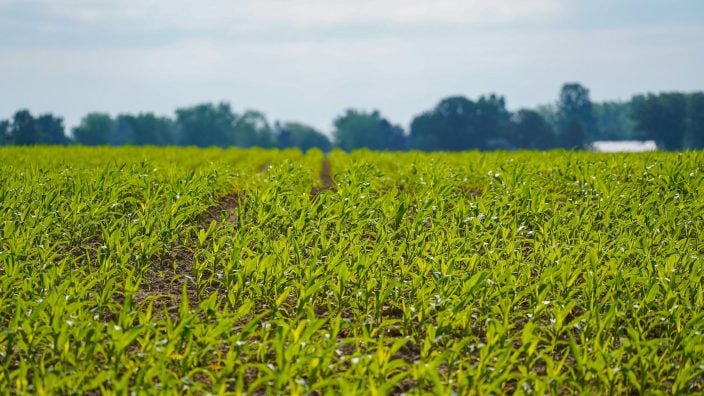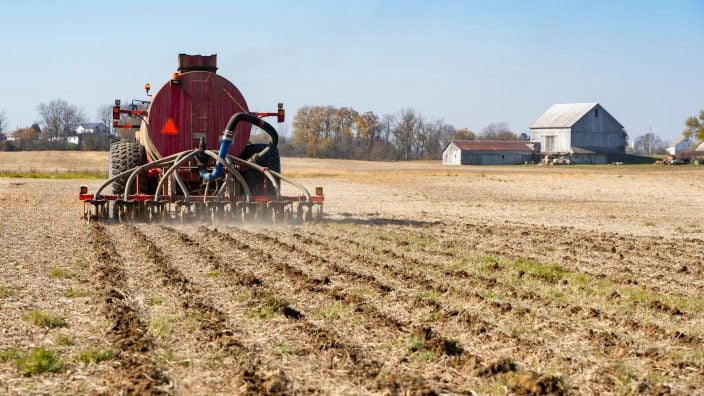Legal with Leah: The questions around data centers
Leah Curtis joins this Legal with Leah to talk about what data centers mean for local communities and how to stay engaged in the development process
Read MoreHow will this impact Ohio farmers and what can be done to allow for use of the products that have already been purchased?
A U.S. District Court of Arizona recently vacated critically important crop protection tools and, for now, farmers will not be able XtendiMax, Engenia and Tavium during the 2024 growing season. How will this impact Ohio farmers and what can be done to allow for use of the products that have already been purchased? Ohio Farm Bureau Policy Counsel Leah Curtis has the details in this Legal with Leah.
Listen to Legal with Leah, a podcast featuring Ohio Farm Bureau’s Policy Counsel Leah Curtis discussing topics impacting farmers and landowners.
Ty Higgins [00:00:00] This is Legal with Leah. I’m Ty Higgins, joined by Leah Curtis, policy counsel with Ohio Farm Bureau. Always great to see you, Leah.
Leah Curtis [00:00:07] Very good to see you.
Ty Higgins [00:00:08] So dicamba back in the news again for uncertainty around registrations. Give us a little history on this litigation and dicamba.
Leah Curtis [00:00:16] So back in 2020, the federal EPA registration of dicamba was vacated in a lawsuit was filed by a number of groups that included the Family Farm Coalition and the Center for Biological Diversity. And so in that case, what had happened was the court found EPA did not fulfill its duty to find that dicamba did not significantly increase the risk of unreasonable adverse effect on the environment. And that’s a requirement whenever they are reviewing a registration. They have to find that specific thing. So after it was vacated, EPA did issue what’s called an existing stock order that allowed for growers to continue to use any previously purchased products. And that allowed for Ohio farmers, particularly to kind of use those products up until June 30, 2020. And those specifically affected products from Bayer, DuPont and BASF. There was a separate Syngenta product that was not involved with that ruling at the time.
Ty Higgins [00:01:12] So we’re back at it again, with dicamba registration in dispute. What has happened since this last case?
Leah Curtis [00:01:21] So after that all happened, the companies again revised their labels. They resubmitted requests for registration. And so in October of 2020, those applications were granted as an unconditional five year registration for over the top application for both cotton and soybeans. They made a few minor amendments in, I believe, both ’22 and ’23 for specific states. But when that registration was going through review, the EPA did not do what’s called a public notice and comment period because they determined this wasn’t a new registration. They had previously approved a registration for the same product even though it had been vacated. And so they did not go through that process. And so the same groups from the previous case filed a lawsuit particularly pointing to that notice and comment period that did not happen under the Federal Insecticide, Fungicide, and Rodenticide Act.
Ty Higgins [00:02:14] I mentioned dicamba back in the headlines. A ruling was recently issued. What did the court say this time?
Leah Curtis [00:02:20] So essentially, the court said that EPA was wrong to not provide that additional notice and comment period. And because those previous registrations were vacated by the court, these were a new use. This was essentially a new product to use. And so they should have gone through that notice and comment period. That notice and comment may have provided additional concerns that EPA should have taken into account, in issuing these registrations. And then because the court deemed this a serious violation, they actually vacated, again, the dicamba registration that’s currently in place.
Ty Higgins [00:02:56] A lot of our members, a lot of listeners are probably wondering why is this court case that happened all the way out in Arizona going to affect us here in the Buckeye State?
Leah Curtis [00:03:05] So the effect in the reach of of a court ruling really can depend on the law that’s at issue. You know, what is actually happening in the case. And so remember we’ve talked a lot about WOTUS Waters of the United States. We are currently under a case that’s filed out in North Dakota that has put the water rules on hold here in the state of Ohio. So, you know, this happens in lots of different situations. In this case, pesticides are federally registered, which prevents having piecemeal or a patchwork system of 50 different ways to register a pesticide. So if that federal registration is vacated, that’s at that highest level for that product. So it does make it unavailable nationwide. So just like the registration is nationwide, when the registration goes away it also goes away nationwide.
Ty Higgins [00:03:54] So what does that mean for the status now and what is going to happen.
Leah Curtis [00:03:59] So unfortunately, right now we don’t know exactly what’s going to happen. I keep asking for that crystal ball, but they haven’t given it to me yet. But the products impacted are specifically XtendiMax, Engenia and Tavium. And the companies and EPA both have an opportunity to appeal this ruling, which would likely possibly put it on hold until they get through that appeal litigation. And then, as I mentioned, in 2020, when the registration was vacated by a court, an existing stock order was issued to allow for already purchased products to be used, under certain conditions and within a certain time frame. So that’s certainly going to be a possibility again. Farm Bureau has already, and a number of other ag groups have already asked EPA to move forward with an appeal and also to issue an existing stock order. So that farmers who have already invested in these products and in seed, will be able to move forward and use them, as they had intended. And they won’t lose out on those investments nor will they have that disruption to their business. So of course, we’ll be keeping everyone updated as the information does come out and as this issue progresses. But that’s where we are today.
Ty Higgins [00:05:12] Leah mentioned that Farm Bureau outreach to EPA. That was a letter from President Zippy Duvall. You can read that letter in its entirety.


Leah Curtis joins this Legal with Leah to talk about what data centers mean for local communities and how to stay engaged in the development process
Read More

Ohio Farm Bureau advocated for a change in the law to allow family members and employees to handle pesticides while under the supervision of a licensed applicator. The rules around HB 10 are being finalized.
Read More

Four property tax reform bills were signed into Ohio law at the end of 2025. Ohio Farm Bureau Associate General Counsel Leah Curtis breaks down the bills and what the changes mean for Ohioans.
Read More

Learn what the requirements are to legally fly a drone in Ohio as well as steps the Ohio Legislature has taken in terms of security concerns.
Read More

In 2025, about 21 counties are going through a reappraisal or update, and because Ohioans pay taxes one year behind, they will see new property tax bills in January 2026.
Read More

Any unlicensed handlers who use restricted use pesticides will need to have additional training. Farm Bureau will be working on legislation to give employers a choice on how to provide training.
Read More

Current Agricultural Use Value is often discussed as a farmland preservation tool, but there are some other tools in the law that landowners can consider.
Read More

Update: As of Feb. 27, 2025, the Financial Crimes Enforcement Network announced no fines, penalties or enforcement action will be taken against companies based on failure to file or update BOI by March 21.
Read More

Update: As of Feb. 27, 2025, the Financial Crimes Enforcement Network announced they would not issue any fines or penalties or take enforcement action against companies based on failure to file or update beneficial ownership information reports by the March 21, 2025, deadline.
Read More

Update: As of Feb. 27, 2025, the Financial Crimes Enforcement Network announced they would not issue any fines or penalties or take enforcement action against companies based on failure to file or update beneficial ownership information reports by the March 21, 2025, deadline.
Read More